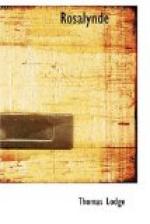Source of “Rosalynde”: “The Tale of Gamelyn." Lodge did not invent the plot of “Rosalynde.” The story is based upon “The Tale of Gamelyn.” This is a narrative in rough ballad form, written in the fourteenth century and formerly attributed to Chaucer. Indeed all the copies of it that have been preserved occur in the manuscripts of the “Canterbury Tales” under the title “The Coke’s Tale of Gamelyn.” From the “Tale” Lodge borrowed and adapted the account of the death of old Sir John of Bordeaux, the subsequent quarrel of his sons, the plot of the elder against the younger by which the latter was to be killed in a wrestling bout, the wrestling itself, the flight of the younger accompanied by the faithful Adam to the Forest of Arden, and their falling in with a band of outlaws feasting. Yet from the “Tale” Lodge took hardly more than a suggestion. All the love story was his own. Original also, so far as we know,[1] was the story of the two kings, and the pastoral element—for “Rosalynde” is a pastoral romance.
[Footnote 1: It has been conjectured that Lodge drew upon some Italian novel for the material that he did not find in “The Tale of Gamelyn.” There seems, however, no ground for denying to Lodge credit for some originality; for the novel, if it ever existed, has been lost.]
Form: A Pastoral Romance. As a pastoral romance it belongs to the class of books of which Sidney’s’ “Arcadia” is the most famous representative in English. The “Arcadia” was published in 1590—the same year as “Rosalynde”—though it had been written some ten years earlier. The literary genus to which they belong is a very old one. The prose pastoral romance, that kind of prose romance which professes to delineate the scenery, sentiments, and incidents of shepherd life,[1] is, like most other




